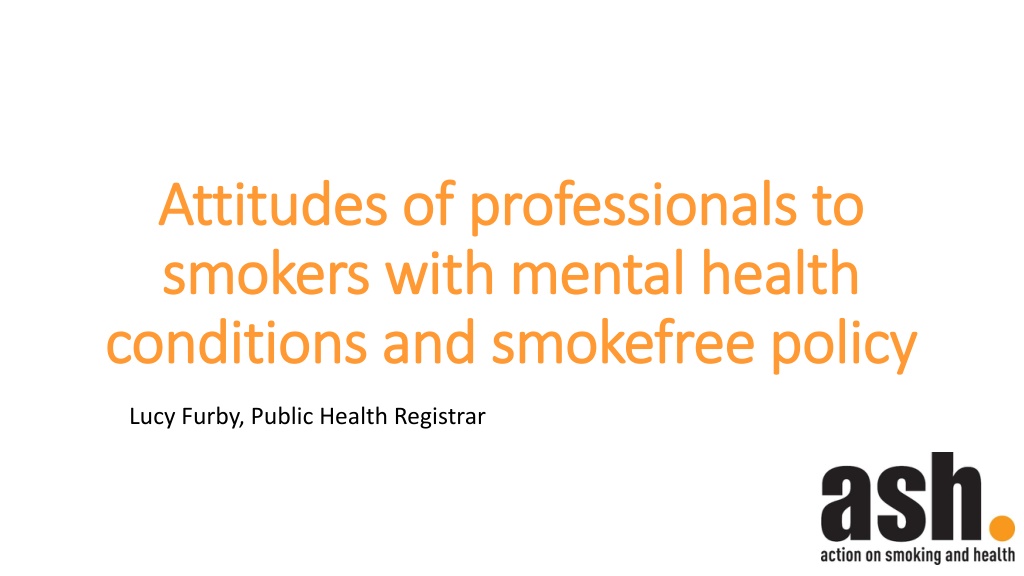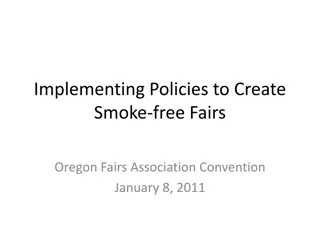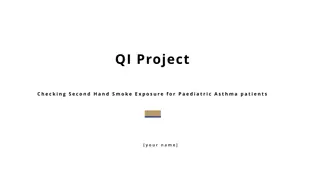Professionals' Attitudes Towards Smokers with Mental Health Conditions and Smoke-free Policy
Lucy Furby, a Public Health Registrar, conducted research on staff attitudes towards smokers with mental health conditions and the implementation of smoke-free policies. The study, carried out from November 2019 to February 2020, focused on psychiatrists and mental health nurses. Findings revealed beliefs in patients' motivation to quit smoking, the role of smoking in mental health settings, organizational barriers, inconsistent support, and policy compliance challenges. The research sheds light on the complexities professionals face in addressing smoking within mental health contexts.
Download Presentation

Please find below an Image/Link to download the presentation.
The content on the website is provided AS IS for your information and personal use only. It may not be sold, licensed, or shared on other websites without obtaining consent from the author. Download presentation by click this link. If you encounter any issues during the download, it is possible that the publisher has removed the file from their server.
E N D
Presentation Transcript
Attitudes of professionals to Attitudes of professionals to smokers with mental health smokers with mental health conditions and smokefree policy conditions and smokefree policy Lucy Furby, Public Health Registrar
Background Background Findings on staff attitudes and beliefs were part of a larger report written in response to the gaps in training of psychiatrists and mental health nurses Qualitative and quantitative research was carried out November 2019 to Feb 2020 (pre-COVID lockdowns).
Method Method Many professions contribute to health outcomes for people with mental ill health but we only had capacity to focus on MH nurses and psychiatrists Focus groups Psychiatrists: two focus groups with 22 participants in total MH nurses: two focus groups with 15 participants in total Survey Survey ran in November 2019 to Feb 2020 265 respondents were included in final analysis
What Ill be covering What I ll be covering Staff attitudes and beliefs Beliefs in patient appetite and ability to quit Role of smoking in mental health settings smokefree policy Organisational barriers Inconsistent pathways and support across settings and services Lack of provision of alternative activities Policy compliance
Staff attitudes and beliefs Staff attitudes and beliefs
Beliefs in patient appetite and ability to quit Beliefs in patient appetite and ability to quit Agreement levels to statement Patients with mental health conditions are not motivated to quit
Beliefs in patient appetite and ability to quit Beliefs in patient appetite and ability to quit Do you ever discourage patients with mental health conditions from stopping smoking until after their mental health improves?
Role of smoking in a mental health setting Role of smoking in a mental health setting Cigarettes are almost like a currency on the ward, like a social fabric of the ward, people socialise over, so it s part of their, their culture almost, getting to know one another, forming groups. There is a lot of cynicism about smoking cessation among staff in those areas because they actually see some therapeutic benefits those cigarette breaks in terms of their therapeutic relationships to the patients. There was a reliance historically in my area in the hospitals of relying on cigarettes for assuaging irritations and smoothing out crumples in the daily routine around making sure nicotine was available.
Perceived conflict between Perceived conflict between smokefree and inpatient staff values and inpatient staff values smokefree policy policy Despite the health promotion rationale for smokefree policy many participants felt that smokefree policy: had undermined the role cigarettes played negatively impacted on patient experience negatively impacted on the patient/staff therapeutic relationship increased the incidence of violence and aggressive behaviour limited personal freedom and enjoyment
Perceived conflict between Perceived conflict between smokefree and inpatient staff values and inpatient staff values smokefree policy policy I mean at the same time it s when all of someone s liberty is taken away and the ability to go and smoke might be the one thing that they still have some control or choice over. (Psychiatrist consultant) I also find that if they re stuck in hospital smoking might be the only thing that they enjoy or that they find relaxing so there s a balance to be struck. (Psychiatrist consultant)
Perceived conflict between Perceived conflict between smokefree and inpatient staff values and inpatient staff values smokefree policy policy I think this is a very important subject which improves clients quality of life and their health (MHN) Whilst completely supporting training for staff and all assertive supportive measures to help patients stop smoking, I believe that the smoking ban in hospitals is immoral, overly authoritarian and deeply damaging to the engagement and therapeutic care of many patients. I wholeheartedly oppose it. (psych)
Perceived responsibilities around patient Perceived responsibilities around patient smoking status smoking status Staff did not always recognise that they had responsibilities beyond recording smoking status. Some psychiatrists action on smoking as outside of professional remit as it related to physical health I think the issue is partly that there s been a culture in psychiatry which means that we re not responsible or we don t deal with physical health and that we will do some aspects of it but not, not very much. (Psychiatrist)
Organisational barriers Organisational barriers
Lack of consistent support across settings and Lack of consistent support across settings and services services Lack of consistent support across pathways and services is evident Community staff didn t always see the relevance of smokefree guidance which was often written with inpatient settings in mind For our trust I think what is, we ve noticed now 18 months in, desperately lacking is that community-based support is missing from the programme (Mental Health Nurse)
Lack of alternative activities Lack of alternative activities a few patients were telling me that it s very difficult to survive without a cigarette because it brings structure to their environment, it creates a timetable in their day and perhaps there should be thought for the inpatient teams for what to do instead. (Psychiatrist)
Policy compliance Policy compliance breaches of policy and lack of consistency in policy implementation undermined efforts of staff who complied with policy What makes it slip is the heroes who say [to patients who smoke] look just go out there and have a cigarette, I m not going to say anything to anyone they undermine it for absolutely everyone else. (mental health nurse)
To sum up: To sum up: Staff understanding of the harms of smoking and the inequalities it drives in their client group appear detached from their understanding of the purpose of local smokefree policies. Certain negative beliefs (which evidence contradicts) are likely to create significant barriers to addressing smoking, such as: People with a mental health condition are not motivated to quit; smoking plays a positive role in the culture of mental health settings; smokefree policies are unethical, and; addressing smoking is not the role of mental health professionals. Organisational constraints create further barriers
What do these findings tell us? What do these findings tell us? These findings mirror previous evidence and literature on staff attitudes and beliefs negative attitudes towards smoking cessation and permissive attitudes towards smoking are major barriers to change. While staff attitudes and beliefs can be addressed to some extent through training, they are also underpinned by organisational culture. Change will not, therefore, be achieved through training alone. Importance of involving services users and listening to their stories.
this notion [we have] of the poor mental health patient who you know, doesn't have much going for them and the only joy in their life is their packet of cigarettes and who am I to take that away from them I think it would be worth having some kind of training to challenge your own beliefs of people's potential it's just like [we have] a biased and slightly patronising viewpoint but at the same time it kind of represents the model of care that we're giving people, that [we think] the only solace they have is in a cigarette, which doesn't really reflect well on us (Consultant Psychiatrist)























